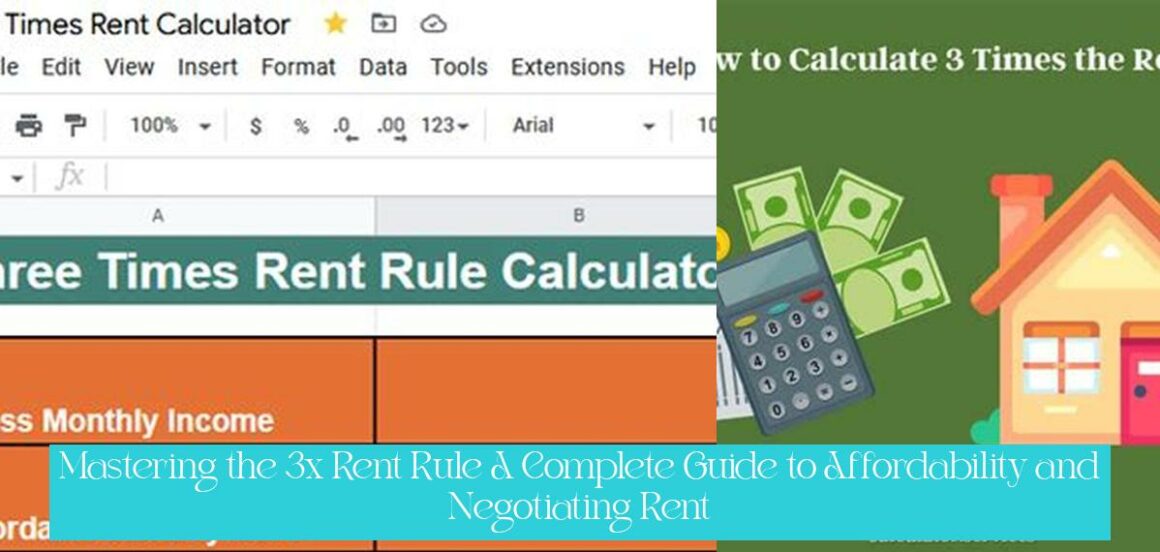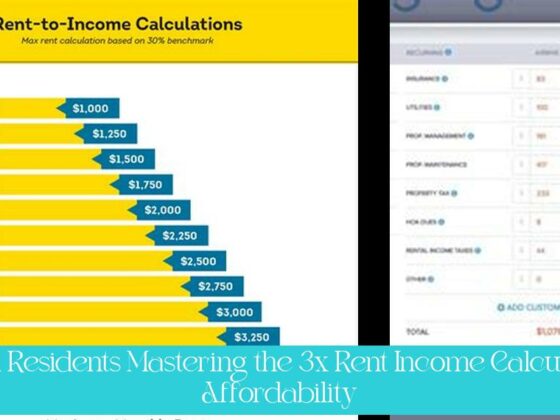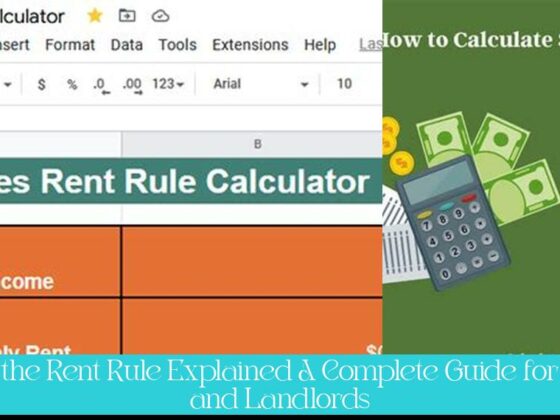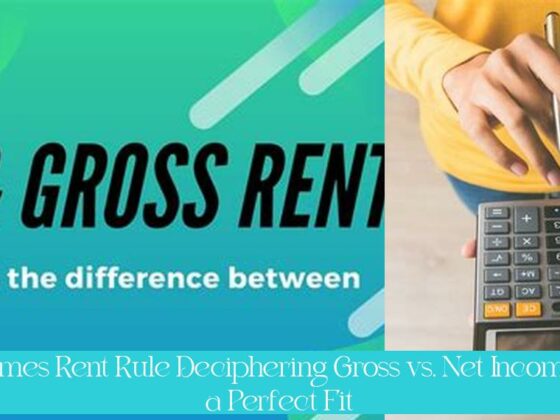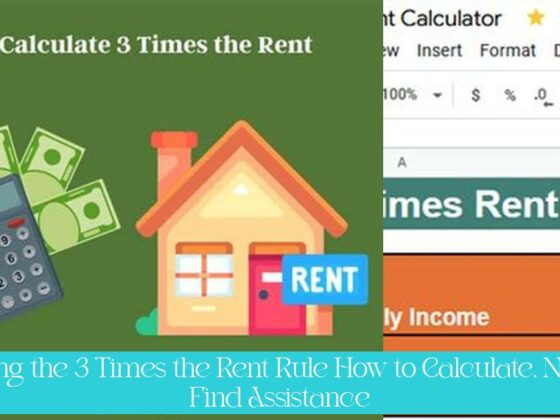Unlocking the secret to renting success: The 3x Rent Rule. Ever wondered just how much you should be making to afford that dream apartment? Look no further! In this comprehensive guide, we’ll dive into the nitty-gritty of the 3x rent rule, offering invaluable tips on negotiating rent, understanding its rationale, and exploring alternative affordability considerations. So, buckle up and get ready to calculate your way to the perfect rental fit!
Key Takeaways
- The 3x rule for rent affordability states that your gross monthly income should be at least three times the monthly rent.
- For an apartment with a monthly rent of $1,500, you would need a gross monthly income of at least $4,500 to meet the 3x rule.
- Mortgage lenders and private landlords often require tenants’ annual salaries to be at least three times the monthly rent.
- To calculate 3 times the rent, simply multiply the monthly rent by 3.
- The 3x rent rule is based on gross income, not net income.
- Financial planners advise that housing costs, including rent, should not exceed 30% of your before-tax income.
The 3x Rent Rule: A Comprehensive Guide
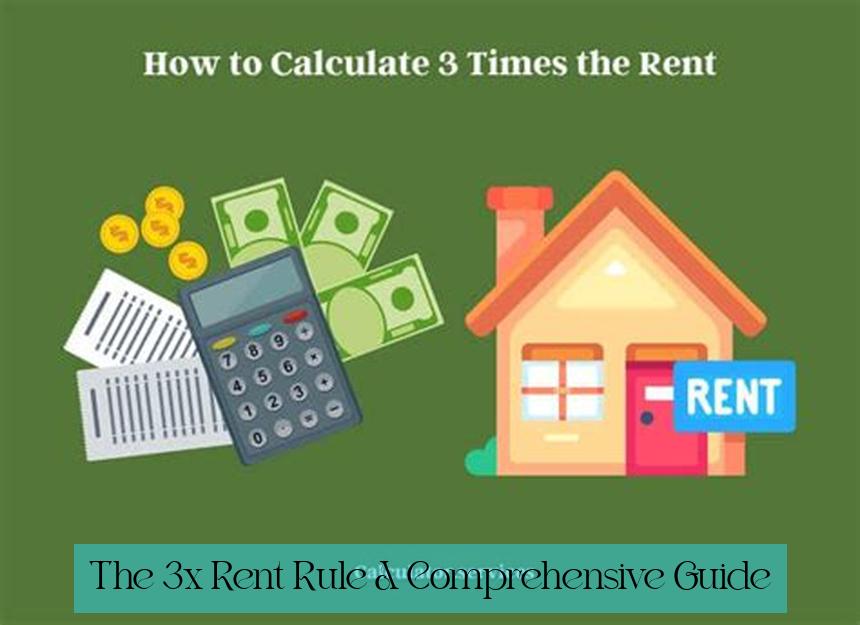
The 3x rent rule is a general guideline used by landlords and financial advisors to assess whether a prospective tenant can afford a particular rental property. According to this rule, a tenant’s gross monthly income should be at least three times the monthly rent. This rule aims to ensure that tenants have sufficient income to cover their housing expenses and other living costs comfortably. However, it’s important to note that this rule is not a legal requirement and may vary depending on individual circumstances and local rental markets.
Understanding the Rationale Behind the 3x Rent Rule
The 3x rent rule is based on the assumption that housing costs should not exceed 30% of a tenant’s gross income. This ratio is considered a reasonable balance between affordability and financial stability. By adhering to this rule, tenants can ensure that they have enough income left over to cover other essential expenses such as food, transportation, healthcare, and savings. Exceeding this ratio can lead to financial strain and difficulty in meeting other financial obligations.
Calculating 3x the Rent
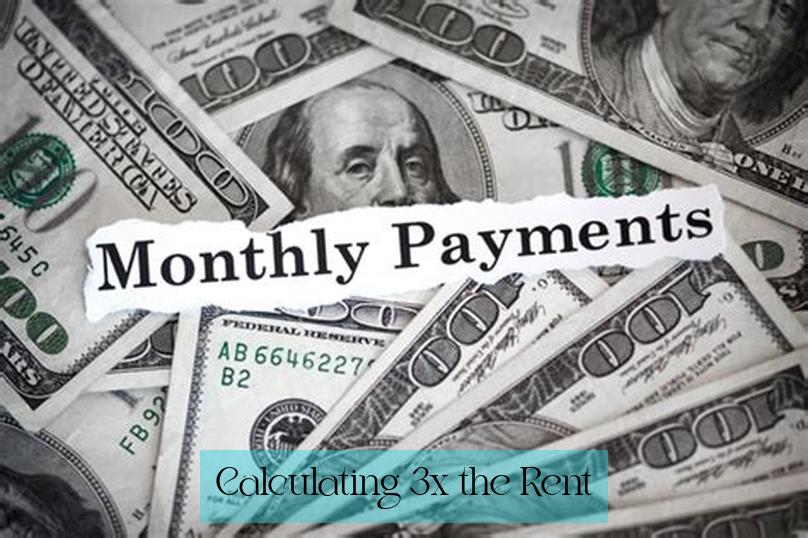
Calculating 3x the rent is a straightforward process. Simply multiply the monthly rent by 3. For example, if the monthly rent is $1,500, then 3x the rent would be $4,500. This means that a prospective tenant would need a gross monthly income of at least $4,500 to be considered for the rental property.
Autres articles: Mastering the 3x Rent Income Calculator: A Complete Guide for Affordability
Exceptions and Considerations
While the 3x rent rule is a widely accepted guideline, there may be instances where it’s not strictly followed. Some landlords may be willing to rent to tenants who do not meet the 3x rent requirement, especially in competitive rental markets. Additionally, tenants with excellent credit scores, stable employment histories, or additional sources of income may be able to negotiate more favorable terms.
Alternatives to the 3x Rent Rule
In some cases, alternative methods may be used to assess a tenant’s ability to afford rent. These methods include:
Income-to-rent ratio: This ratio compares a tenant’s gross monthly income to their monthly rent. A ratio of 40% or less is generally considered affordable.
Debt-to-income ratio: This ratio measures the amount of debt a tenant has relative to their income. A debt-to-income ratio of 36% or less is considered a good rule of thumb.
Rental history: A tenant’s rental history can provide valuable insights into their ability to pay rent on time and maintain a property. Landlords often consider a tenant’s previous rental references and eviction history when making a decision.
Affordability Considerations for Tenants
When considering a rental property, it’s crucial for tenants to assess their financial situation and determine if they can comfortably afford the rent. Here are some factors to consider:
Gross Income vs. Net Income
It’s important to distinguish between gross income and net income when applying the 3x rent rule. Gross income refers to your income before taxes and other deductions, while net income is your income after taxes and deductions. The 3x rent rule is based on gross income, so it’s essential to factor in taxes and other deductions when calculating your affordability.
Additional Expenses
In addition to rent, tenants also need to consider other expenses associated with renting, such as utilities (electricity, gas, water), renter’s insurance, parking fees, and maintenance costs. These expenses can add up quickly and should be factored into your budget.
Emergency Fund
It’s always a good idea to have an emergency fund in place to cover unexpected expenses, such as a job loss or medical emergency. Having an emergency fund can provide peace of mind and prevent you from falling behind on rent payments.
Lifestyle Factors
Your lifestyle and spending habits can also impact your ability to afford rent. If you have a high-maintenance lifestyle or significant financial obligations, you may need to adjust your budget or consider a more affordable rental option.
Tips for Negotiating Rent
In some cases, it may be possible to negotiate a lower rent with your landlord. Here are a few tips:
Be Prepared with Data
Before negotiating, research comparable rental properties in your area to determine a fair market rent. This information will give you a strong starting point for negotiations.
Highlight Your Strengths
Emphasize your positive qualities as a tenant, such as your stable employment history, excellent credit score, and responsible rental history. Landlords are more likely to be flexible with rent for tenants who are reliable and low-risk.
Populaire en ce moment — State Farm Dock Insurance: Comprehensive Coverage for Your Waterfront Property
Be Willing to Compromise
Negotiation is a give-and-take process. Be prepared to compromise on certain aspects, such as the length of the lease or the move-in date, in order to secure a more favorable rent.
Consider a Gradual Increase
If you’re struggling to meet the 3x rent requirement, you could propose a gradual increase in rent over time. This can give you more time to adjust your budget and make the rent more affordable.
Remember, negotiating rent is not always successful, but it’s worth trying if you believe you can secure a more affordable rate. By following these tips and understanding the 3x rent rule, you can increase your chances of finding a rental property that meets your needs and budget.
1. What is the 3x rent rule?
The 3x rent rule is a guideline used by landlords and financial advisors to assess whether a prospective tenant can afford a particular rental property. It states that a tenant’s gross monthly income should be at least three times the monthly rent.
2. How do you calculate 3 times the rent?
To calculate 3 times the rent, simply multiply the monthly rent by 3. For example, if the monthly rent is $1,500, then 3 times the rent would be $4,500.
3. What is the rationale behind the 3x rent rule?
The 3x rent rule is based on the assumption that housing costs should not exceed 30% of a tenant’s gross income, ensuring a reasonable balance between affordability and financial stability.
4. How much income is needed to afford $1,500 rent based on the 3x rule?
According to the 3x rule, a gross monthly income of at least $4,500 is needed to afford a rental property with a monthly rent of $1,500.
5. Are there exceptions to the 3x rent rule?
While the 3x rent rule is a widely accepted guideline, there may be instances where it’s not strictly followed, especially in competitive rental markets or for tenants with excellent credit scores and stable employment histories.
6. What are the alternatives to the 3x rent rule?
In some cases, alternative methods may be used to assess rental affordability, such as considering net income, credit scores, employment history, and additional sources of income.
